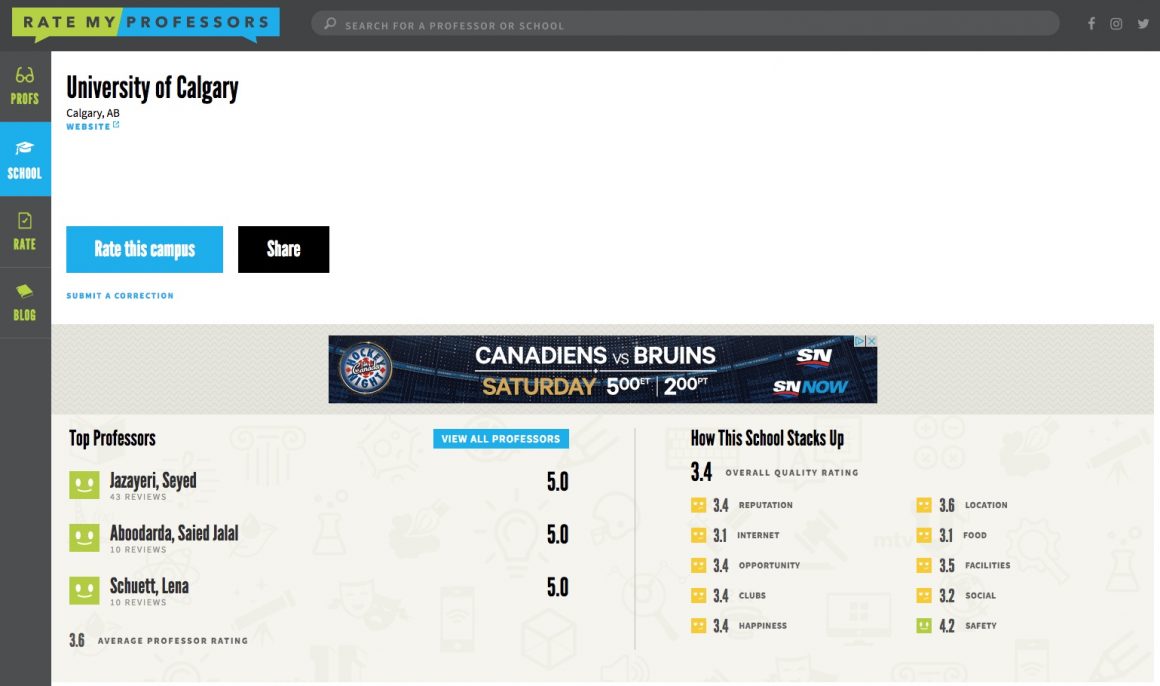
Head-to-Head: Is RateMyProfessor.com helpful?
March 1, 2018 —
Students often use the website RateMyProfessors.com (RMP) when making their class schedules.Does it ensure success come September or is it misleading at best?
When I build my course schedule, I always pick classes knowing that I’m going to shop around in the two-weeks at the beginning of the semester after I read the course outlines.
At the University of Calgary, there simply isn’t an effective tool to judge classes with other than sitting in them and reading through the syllabus. Sometimes friends’ opinions are helpful to rule out particular profs, such as the one who is notorious for assigning 30-page papers or writing unfairly tricky midterms. But I would never rely solely on another student’s opinion of a prof as a reason to take a class.
Since I won’t trust even my closest friends’ opinions on profs, I obviously won’t listen to complete strangers. That’s why I ignore the site RateMyProfessor.com. There’s a few good reasons other students’ thoughts on profs aren’t worth listening to.
First of all, the students that post on RMP fall into two categories — those who probably failed the class and harbour a deep-seated grudge against the professor and those who did extremely well and think an anonymous post on a website will curry favour with them in the future. There is no in-between. No rational person takes the time to write a post along the lines of, “This prof is fine.”
Also, students usually lie about their grades. Whenever someone nonchalantly states, “Oh yeah, I totally got an A in that class,” they probably secretly mean they got an A-. No one nonchalantly gets an A. Life is not that easy. Whenever someone posts, “This class is an easy A” on RMP, it’s tough to believe that their unique learning style helped them achieve such high grades without extraordinary effort. Most students need to put in work to get good grades.
We all have academic preferences. I personally prefer written assignments over multiple choice tests. Because of this, I need to read course outlines to ensure classes are based primarily on written work before I’m sure I’ll enrol. Some students aren’t like that — and that’s fine — but that’s also why I couldn’t care less what those students are saying on RMP.
My advice is not to get too attached to your schedule this March. Shop around at the beginning of September and find classes that suit your learning style, not classes with profs that strangers on a website seemed to like.
The instructor of a class can play a pivotal role in students’ success in their courses. For myself, the prof can make or break a class. I can usually tell after the first few lectures whether or not I’ll do well under their teaching style. In most cases, I do — largely because of the research I’ve done before selecting my classes. Now completing my fourth year, RateMyProfessor.com (RMP) has provided a substantial amount of advice on the classes I have chosen to take.
Learning styles vary from person to person. Some students do well without paying much attention in lectures and instead learn best through self-directed methods like reading textbooks. However, for those who are auditory learners, it’s important they have a professor they can effectively acquire and digest information from. RMP can provide insight into the teaching style of a lecturer, which is vital for auditory learners.
The website’s advice isn’t perfect. The many aspects of teaching cannot be reduced into ranking the prof’s overall quality, the course’s level of difficulty and a chili pepper. Still, the reviews in the comment section can provide insights into the teaching style of a lecturer. Though the reviews should be taken with a grain of salt, they are often not far off the mark.
There are other opportunities to find information about a professor’s teaching style besides the infamous website. Both word-of-mouth from your peers and the Universal Student Ratings of Instructions (USRIs) are informative about the strengths and weaknesses of a lecturer. Though these methods can also provide guidance when choosing professors, they come with faults as well.
For USRIs, actual comments are not available. Furthermore, the sample you get is only from those who attended the class in which the survey was given. The survey cannot take into account the views of those who chose not to attend. If you learn best through lectures, the reviews and reasoning of those who chose not to attend lectures are just as important — if not more — than those who did attend class that day.
Ultimately, the only sure-fire way to know if you’ll like an instructor is by taking their class. Using RMP, however, can give you an idea of what you’re signing up for before it’s too late to drop the class and find a replacement, saving you time, stress and money.
